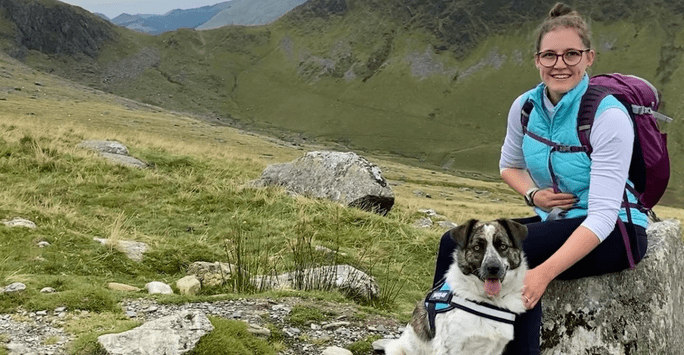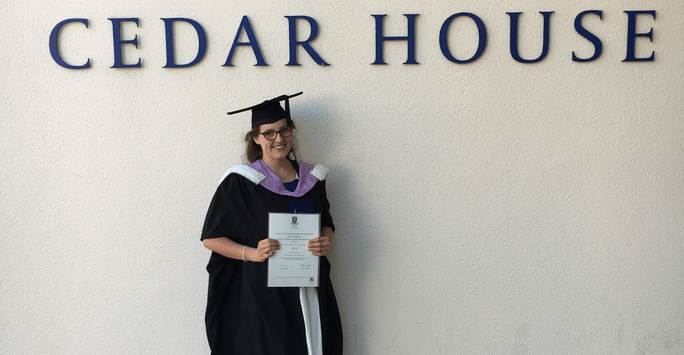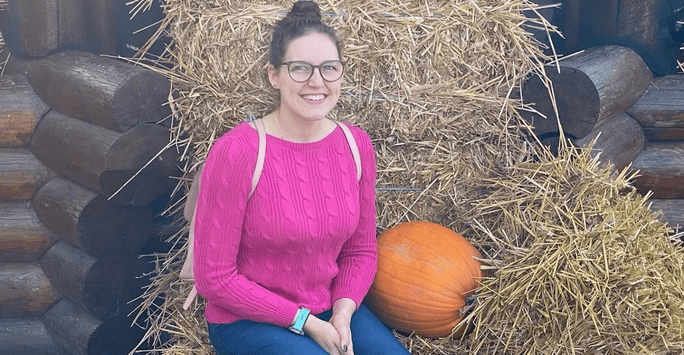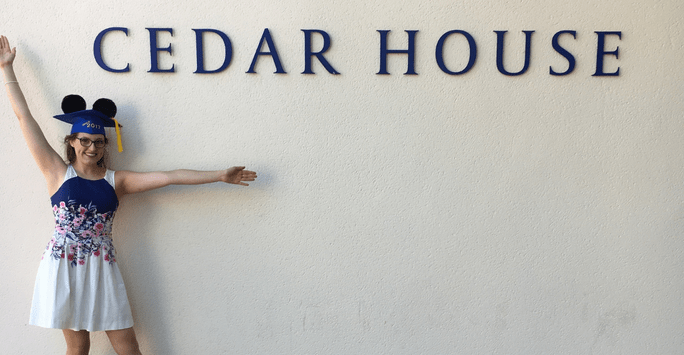Medicine alumni stories: A Liverpool Graduate who hasn't yet left

Dr Kaylea Clark has maintained strong links with Liverpool School of Medicine since graduating in 2017 – acting as an examiner for clinical assessments, being part of the School’s Associate Clinical Teachers (ACT) programme and, this year, deepening her interest in medical education further as an Academic Fellow.
Her passion for teaching, appreciation of the benefits of being a ‘generalist’, and love of people (and talking the ear off them!) have been in motion since her undergraduate days.
What brought you to Medicine, and to Liverpool?
I had always been interested in the human body and love people – they fascinate me, we are all so different. Also, talking is probably my favourite thing to do – my mum will attest to that fact! So, Medicine seemed the perfect career for me – Yes, I get paid to talk!
I am originally from Manchester and while I preferred not to stay at home for university I did not want to move too far away. I selected four universities which were relatively close to home and hoped to get a spot – Liverpool chose me, and it’s been stuck with me ever since!
What do you remember of your first weeks of University?
I am of the generation that had to dress the part – there were no scrubs for my cohort. I distinctly remember on Day 1 turning up to Clinical Skills in jeans and a jumper, as many others had, and being advised of the dress code. Following the session, I tootled down to Primark to buy “Dr Clothes” and I don’t think I’d ever felt so fancy or proud before.
In truth, the first few weeks were quite overwhelming. I hadn’t realised how much of a home bird I was. All of a sudden there was so many new people to meet, new learning styles to master and so much content to process, all mixed in with a healthy bout of ‘Fresher’s flu’. It took a few weeks, but I found my feet and settled into university life; I thrived on the independence I was given and the ability to manage my time and plan my days. I probably did the most ‘growing up’ during those first few weeks at university and once I started to get the hang of it there was no stopping me.

What has stuck with you most from your time at the School?
The people. The tutors you have now may be your supervisors on ward placements, or colleagues as doctors in years to come. You will learn so much from the people around you and the experiences they have had. I still remember things from the now long-gone Problem Based Learning Sessions (showing my age there!) and am thankful for the people that I have interacted with over the years.
I am a Liverpool Graduate who has not yet left - the reason for this is the people that I have been able to interact with, learn from and be inspired by over the years.
How did you overcome any challenges you faced during your time at the School?
One challenge in particular was the introduction of a new curriculum mid-way through the course. At the time I probably did not handle this as well as I could have and felt quite hard done by. Putting on my retro-spectascope this was probably one of the most beneficial untaught learning experiences from my time as a student. It helped to develop my emotional resilience as well as my ability to adapt to change. Things in Medicine change all the time, and we have to be open and responsive to these changes. The new curriculum was brought about to introduce improvements for us as students and benefit our learning. If I could do it all over again, I would choose to ask myself ‘Why are the University changing things?” Realistically it is going to be to benefit the students.
How did your studies and placements help you decide on your path and career in medicine?
I would see friends absolutely LOVE a particular subject area, whereas I was interested in everything but not to the same level of detail. This made me realise that I am a generalist at heart rather than a specialist. I prefer to know a little about a lot as opposed to a lot about a little. During Year 5 I was able to experience both General Practice and Emergency Medicine and I found that I preferred managing the acutely unwell as opposed to the chronically unwell, and so I opted towards Emergency Medicine for speciality training.

How did the School’s Associate Clinical Teachers (ACT) programme help you develop your medical education portfolio?
The ACT Programme was amazing. I have always loved to teach; and the feedback from students has largely been very positive. This informed me that what I was doing was good, but in truth I wanted more. The ACT programme allowed me to get constructive feedback from fellow educators on my teaching skills. I was able to be observed teaching a variety of sessions – Face to Face Clinical Skills and Case Based Learning, as well as virtual Communications. Having fellow educators appraise and critique my performance was incredibly useful for my personal development as an educator.
As I have mentioned previously; I like to talk. The programme introduced me to other clinicians who share an interest in Medical Education which allowed me to network with others in the field.
Tell us about your role as Education Fellow this academic year.
As an Education Fellow I teach a little bit of everything - Case Based Learning, Communication for Clinical Practice, as well as ad hoc workshops. We have recently completed a workshop on the Situational Judgement Test for the Year 5 Students which was so much fun. This approach fits in well with my generalist nature. My personal aims for this year are to build my teaching portfolio and develop my teaching skills. After experiencing a curriculum change during my time at medical school I have developed an interest in the management side of Medical Schools; for example, how Schools design and implement a curriculum, so I am hoping to gain a better understanding of this whilst I am here.
What is the most surprising aspect of medical teaching you have come across so far?
I’ve engaged with lots of teaching since graduating from Liverpool. However, this year one of the most surprising aspects was how tricky it is to deliver someone else’s content. To ensure that all students receive the same content and quality of teaching, tutors are provided with guides to inform us of what is to be covered. This was initially a bit of a challenge for me as I had not done this before. Using these guides has allowed me to approach my teaching from another angle; I have not just sat in my comfortable style of teaching. As a result, I have been able to develop my skills as an educator as I engage with different resources and tools - I generated a QR Code for the first time this year! – It is good to challenge ourselves and expand our comfort zones.

How do you find the role of examiner?
I have been examining for the School’s Clinical Assessments since I graduated. I have a personal interest in feedback, and so the opportunity to give feedback during Assessments for Learning and Progression is always attractive to me. I enjoy watching our students excel in these assessments and feel quite honoured that my contributions are valued; especially when I highlight both students who have excelled and those who may benefit from some more help.
I had not appreciated how much feedback I would be giving as a junior doctor to medical students as well as colleagues. Acting as an examiner and engaging in the examiner training has helped me develop my feedback delivery skills. But importantly has also highlighted to me what level students of each year group should be performing at so that I can assign tasks based on their expected learning outcomes.
You are also a member of the Faculty of Academic and Clinical Educators (FACE).
FACE is a great networking opportunity. It offers a variety of CPD activities where I am able to listen to colleagues present on current educational research publications and engage with group discussions on key topics within medical education, for example how to facilitate a debrief. I find these sessions incredibly beneficial as I am able to listen to numerous perspectives in a relatively short amount of time.
What advice would you have for yourself as a first-year student doctor?
Be nicer to yourself. Consultants train up to 11 years following graduation to be an expert in their field. Medicine is too vast to know everything which is why we get specialist opinions. I did a lot, and I mean a lot a lot, of reading and revising during the early years of my career because I felt this pressure to know everything. The race to consultancy is a marathon not a 100m sprint. Very valuable feedback from my FY1 Supervisor there! We learn as we progress and it’s okay to not know all the answers.
Discover more
- Take the opportunity, like Kaylea, to step into the role of examiner at our clinical assessments running at Aintree Racecourse next March, June and July. Learn more and book a slot on the OSCE Examiner webpage (link).
- The Get Involved page of our Liverpool Educators Online website details all of the current opportunities you can engage with, including being a part of our clinical assessment and Admissions interview processes.
- Do you too have a passion for medical education? Find out about the different programmes and opportunities for educators available at the School on our Teach With Us page (link).
- Are you a Liverpool graduate with a story to tell? Get in touch with us at mednews@liverpool.ac.uk.